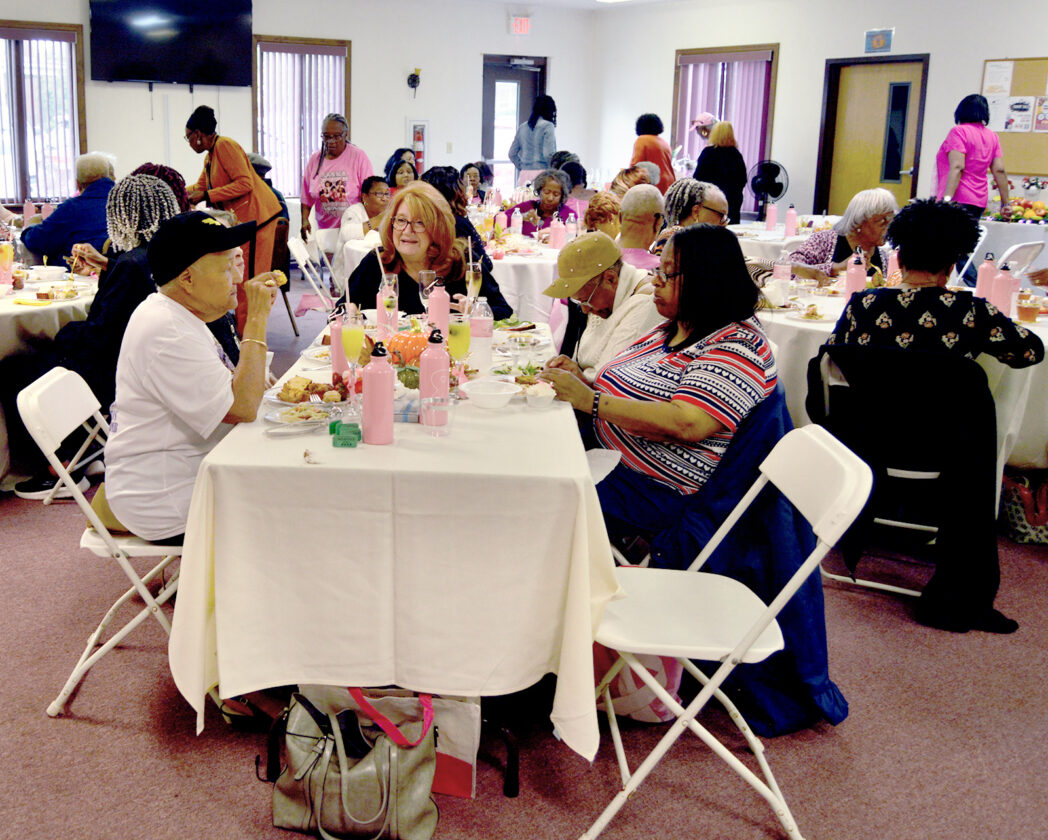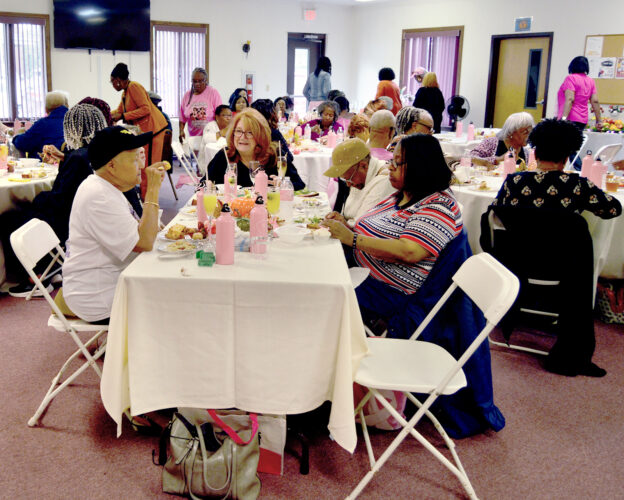
BRUNCH — Individuals dined during the Breast Cancer Awareness Brunch, hosted Saturday at Mount Carmel Community Baptist Church by the Ohio Valley District of the National Association of Colored Women’s Clubs. — Christopher Dacanay
STEUBENVILLE — Hosted by the Ohio Valley District of the National Association of Colored Women’s Clubs, an event Saturday educated local women about breast cancer and the need for testing to promote better outcomes.
Composed of the La’Femme and Sojourner Truth clubs, the Ohio Valley District put on its second-annual Breast Cancer Awareness Brunch at Mount Carmel Community Baptist Church. The event featured food, informational booths and a talk by Dr. Margaret Rosenzweig, a professor for the University of Pittsburgh School of Nursing.
Open to club members and the public, the event has been received “very well” since its inception, said district President Patricia Bailey. The district is also known for its Minority Health Month event in April, but this year, the events were consolidated to focus on promoting Breast Cancer Awareness Month in October.
Bailey said it’s important for the district to provide expert speakers — particularly those in the research field — who can give women the answers they are seeking about breast cancer.
“We find people that can give you a one-on-one talk” Bailey said. “You can spend more time with that person at this (event), with something you’re interested in, than with your regular doctor at your appointment. … You’re better informed. Then you can take something back and share it with your doctor, what you would like to see, what tests you would like to have done.”
District and state board member Carol Ann Simmons said that African American women have a disproportionately higher mortality rate from breast cancer than women of other races. Therefore, she added, “We need to be diligent in our exams going to see our doctors and just checking ourselves for health.”
La’Femme Club President Carrie Campbell, who gave the welcoming address, said, “We need to raise awareness, help people to ask the questions that they’re scared to ask to make sure that they know this is not a women thing, thing is not a white thing, not a Black thing. It’s a disease that we can all work together to get rid of. And there’s help out there.
Sojourner Truth Club President Rose Marie Slaughter, who introduced service providers at the event, said being aware of breast cancer’s possibility is important because “if we have a problem, we can find it out and do something to help our health — catch it early.”
Providers included the Diversity Health Initiative, CHANGE Inc., the Ohio Valley Health Center, the Jefferson County General Health District and Trinity Health System. Bailey noted that being knowledgeable of available resources is vital.
Prior to brunch was the talk from Rosenzweig, who is a distinguished service professor of nursing and professor of medicine, as well as the vice chair of research in the University of Pittsburgh’s Department of Acute and Tertiary Care.
Rosenzweig and her research team — which has issued more than 130 publications — focus on ensuring timely diagnosis, treatment and support for women with breast cancer. Her own research, education and outreach efforts center on Black women, women with astatic breast cancer and community engagement to combat racial and economic breast cancer survival disparities.
She leads a national initiative in the training of advanced practice oncology providers and operates a clinical practice as a nurse practitioner at the UPMC Magee-Womens Hospital.
Rosenzweig began her talk by noting some statistics, namely that breast cancer is the most common cancer among American women, with one in eight women expected to be diagnosed with breast cancer during their lifetimes. A woman in the U.S. is diagnosed with breast cancer every two minutes, but there has been a 39 percent decline in deaths due to early detection and treatment.
Highly associated with increased age and other genetic factors, breast cancer does see a higher mortality rate among Black women in spite of seeing a lower, yet nearly equal incidence rate as compared to white women, per 100,000 individuals, Rosenzweig said.
Certain personal history and hereditary factors do increase one’s risk for breast cancer, Rosenzweig said. Obesity, for example, is associated with increased risk, including among post-menopausal women who are only 44 pounds overweight. However, Rosezweig noted, strenuous exercising more than four hours per week can help reduce one’s risk.
Preventative therapy utilizing raloxifene or tamoxifen can also make a positive difference for high-risk individuals, Rosenzweig said.
To detect breast cancer early, Rosenzweig said, individuals should begin having yearly or biyearly mammograms starting at age 40. Women with increased risk should consult with their doctors about starting mammography earlier, she added, and clinical breast exams by non-specialists are not recommended.
Furthermore, Rosenzweig said, “Women should know how their breasts normally feel and report any breast changes promptly to their health care providers.”
Rosenzweig explained screenings and the interpretation of their results, as well as possible treatment paths. She addressed several “myths” about breast cancer, noting that — in fact — younger women and men can get breast cancer. Also, she said, only eight out of 10 breast lumps are not cancerous, and if detected and treated early enough, breast cancer survivors have a high survival rate.
Concluding, Rosenzweig referenced the American Cancer Society VOICES of Black Women. The study is seeking input from Black women between the ages of 25 and 55 with no history of cancer diagnosis — save for basal or squamous skin cancer — and who live anywhere in the 20 enrolled U.S. states, which includes Ohio, and Washington, D.C. Individuals can learn more or join by visiting voices.cancer.org.
Rosenzweig said after the event: “Breast cancer information is important because there is so much information (that) it is hard for women to make sense of what applies to them and how that is relevant to their lives. It is important to me because I see women who have questions and sometimes need more education. I am honored to be asked to speak at the event today. The turnout was excellent, and the women and men were so nice. I appreciated spending time with them and was happy to have been asked about it.”
Introduced by DHI founder Dr. Vanessa Palmer, a Q&A session followed the talk and allowed individuals to ask questions from Rosenzweig.

